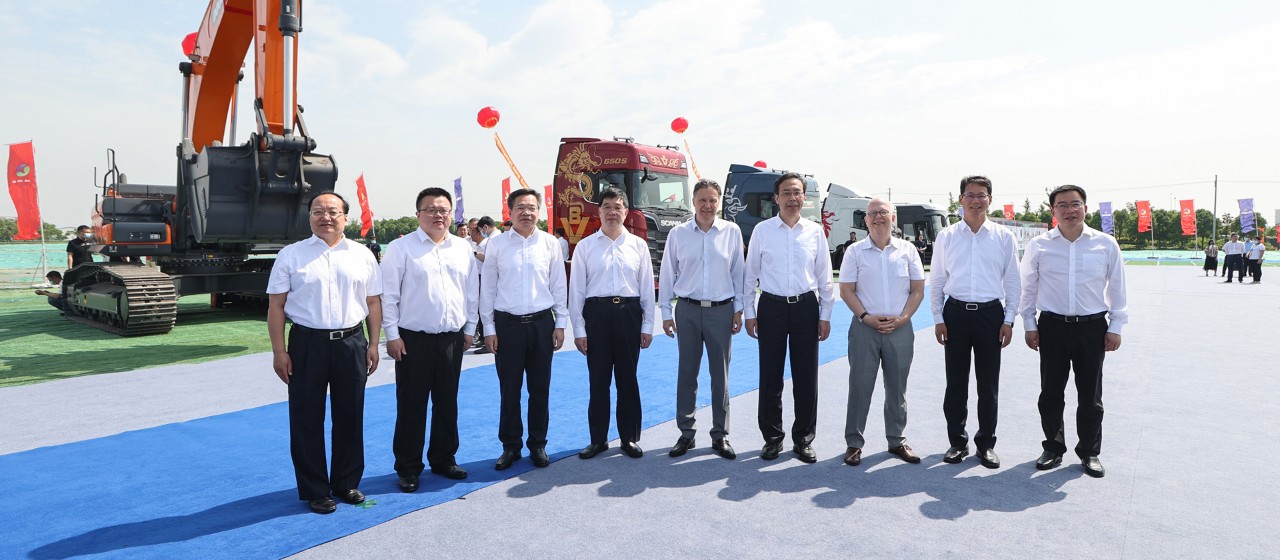
Scania begins construction of new global production base in China
13 JUNE 2022
Site at Rugao city will be zero-emission factory, producing vehicles for both Chinese and export markets.
Scania has taken a key strategic step towards expanding its presence in China and the wider Asian market, by breaking ground for a new global production base in Rugao, Jiangsu Province, 150 km northwest of Shanghai.
The new factory, which is based on Scania’s unique modular production system, will produce vehicles for both the Chinese and Asian export markets when it opens for business in late 2024/early 2025, significantly shortening delivery times to Asian customers. It will be Scania’s fourth global production base, after Södertälje in Sweden, Zwolle in the Netherlands and São Bernardo do Campo in Brazil.
“The timing of this development is fantastic. It’s a unique opportunity for Scania,” says Ruthger de Vries, President Industrial Operations Asia.
“The Rugao facility will provide a boost to our presence in Asia and also to our efforts to drive the shift towards sustainable transport because it will immediately become a zero-emission factory, using green electricity and renewable fuels.”
Biogas made from local wastewater sludge, food waste and other biowaste will be one of the main power sources, meaning that the factory runs on circular energy. In addition to this, the vehicles from Rugao will also be compliant with the most stringent emissions and fuel consumption limitation standards.
The site’s output will also come to reflect the growing sophistication of the Chinese market in terms of special purpose vehicles and sustainable solutions. With a localisation rate of more than 80% and use of the latest technologies, the factory will be able to offer Scania vehicles that have been adapted to Chinese market conditions, so that customers can enjoy very competitive operational economy.
A timely development
As Mats Harborn, President of Scania China Group, explains, the commitment in Rugao is even greater than first planned.
“We expanded the scope of the project during the pandemic, which is why the actual groundbreaking is taking place a little later than first envisaged. Instead of a single assembly line, we were able to acquire more land so we can now build an entire factory. What’s more, since China changed its investment rules, we have been able to act within a narrow regulatory window, enabling us to do this completely by ourselves — 100% Scania,” he says.
“And it’s really exciting that we will start production sometime during 2024/25. By that time Chinese heavy vehicle standards will have moved a step further to being really conducive to the sorts of products we expect to sell to the market.”
Mats Harborn believes the significance of this development for Scania in China and globally cannot be overstated.
“This is the start of a big new strategic investment for us, and we believe that we will be able to capture a major part of this market. With the consolidation that is happening in the industry in China, we believe that by the end of the coming decade there will be maybe five or six truck groups remaining, and we intend to be one of those.”
Strong local support and mutual benefits
The establishment of the new facility has benefited from the great support provided by the Rugao city government, Rugao Economic Technical Development Zone and, in particular, the backing of local Party Secretary He Yijun.
As Ruthger de Vries pointed out at the groundbreaking ceremony on 10th June, “We and the Rugao authorities are creating thousands of new jobs for the local economy.” Further investment is also expected for the construction and running of the new biogas production plant.
“We’re so lucky that we are working with the Rugao authorities, who not only realise that we will put them on the map for the production of advanced heavy-duty vehicles, but also, through the production of biogas, make them a leader in circular energy,” adds Mats Harborn.
“Scania will be the biggest taker of the biogas that we produce in the city. We hope that Rugao will be a model city in producing both biogas for industrial use, but also for fuel gas for buses and trucks.” The factory is also going to be adaptable for the future switch to electrification, enhancing its green credentials still further.
Among those at the groundbreaking ceremony were various representatives of the Rugao authorities and Ruthger de Vries, Mats Harborn and Ino Moberg from Scania. Along with the company’s special advisor Shao Zhonghua, the trio played crucial roles in the preparation of the development, which has created great interest among Scania’s Chinese customer base.
The recruitment and training of workers for the factory has already begun. The first intake of production engineers has been in Sweden since the beginning of May. Scania has also established cooperation with vocational schools and universities in Rugao and the nearby city of Nantong.